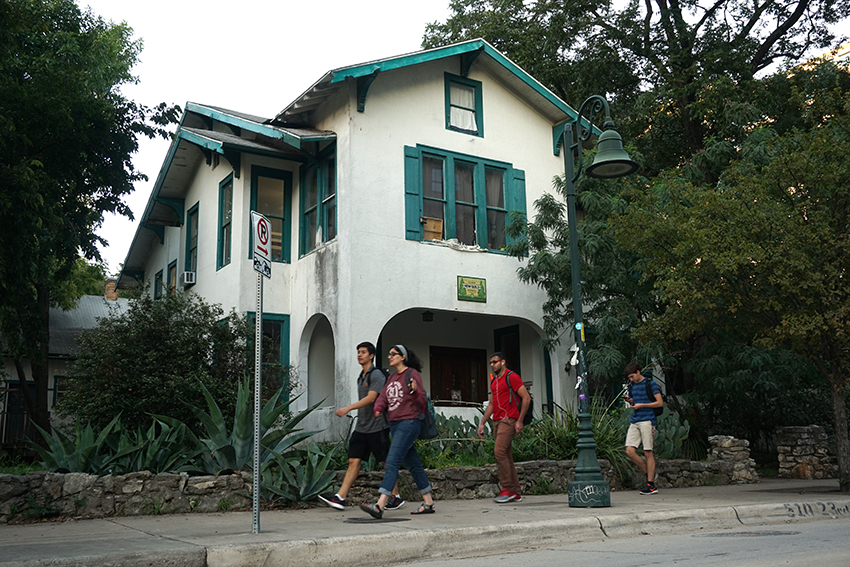Pastel walls, rainbow banners and functional gardens dot West Campus’ stretches of concrete monotony. These eccentricities serve as the face of cooperative living organizations, such as Austin’s Inter-Cooperative Council and College Houses, founded on ideals of domestic democracy and responsible citizenship.
As students struggle to find affordable housing near campus, co-ops present a unique and inexpensive option, yet their target demographic — students with financial need — does not make up the majority of residents in West Campus’ 16 cooperative establishments.
Julia Mitchell, social work junior and vice president of ICC’s Board of Directors, said co-ops utilize the Free Application for Federal Student Aid to determine financial status. This includes the Pell Grant, the Subsidized Stafford Loan and need-based scholarships. On this basis, ICC determined that only 7 percent of their 188 members received housing accommodations due to demonstrated financial need during the 2017-18 school year.
Similarly, College Houses reserves only 10 percent of its 500+ spots for students living below Austin’s median income as required by a University Housing District Trust Fund loan.
“Right now, we reserve 50 spaces at the Super Co-op for income verified students, or students that can provide documentation that they receive need based financial aid,” Kim Garmany, College Houses’ executive director, said.
Concerns regarding economic diversity have not fallen upon uninterested ears. Those at the heart of these non-profit organizations also have concerns about the disparity.
“Housing co-ops are definitely underutilized by students that demonstrate a need for affordable housing, and we’d like to change that,” Garmany said. “We’d like to expand income verified reservations to all of our houses in the near future, but first, we need to make sure that we can fill the spaces we currently have.”
Additionally, Mitchell discussed ICC’s new long-term plan to prioritize lower-income students and combat issues that may cause prospective members to shy away from cooperative housing.
Strides for improvement include building a scholarship fund, lowering rent to better fit a college student’s budget and advertising cooperative living where students of diverse identities and socioeconomic backgrounds are likely to be exposed.
ICC’s newly implemented efforts are paying off, as need-based housing rates rose from 7 percent to 28 percent during their current housing cycle, Mitchell said.
“Making progress is a matter of changing our houses from within and changing our reputation outside of the organization,” Mitchell said.
Mitchell said proving financial need is difficult for international and undocumented students who cannot access federal financial aid. Still, ICC’s doors remain wide open for prospective members who simply cannot afford West Campus’ ever-ascending rent rates.
Fernando Casal, geography junior and Seneca Falls resident, said he acknowledges progress within his own house.
“(Socioeconomic diversity) is an important topic to address — especially with ICC having a lot of internal dialogue regarding what to do about its image and working to create change,” Casal said. “It’s nice that I live with increasingly more working-class folks as I’ve gone through my time here.”
In addition to offering amenities, meals and rates as low as $610, Mitchell stressed that cooperative living fosters tight-knit communities empowered by a share in household governance and commitment to social justice.
“We’re trying to do important things, and anyone can find their space in a co-op,” Mitchell said.





















